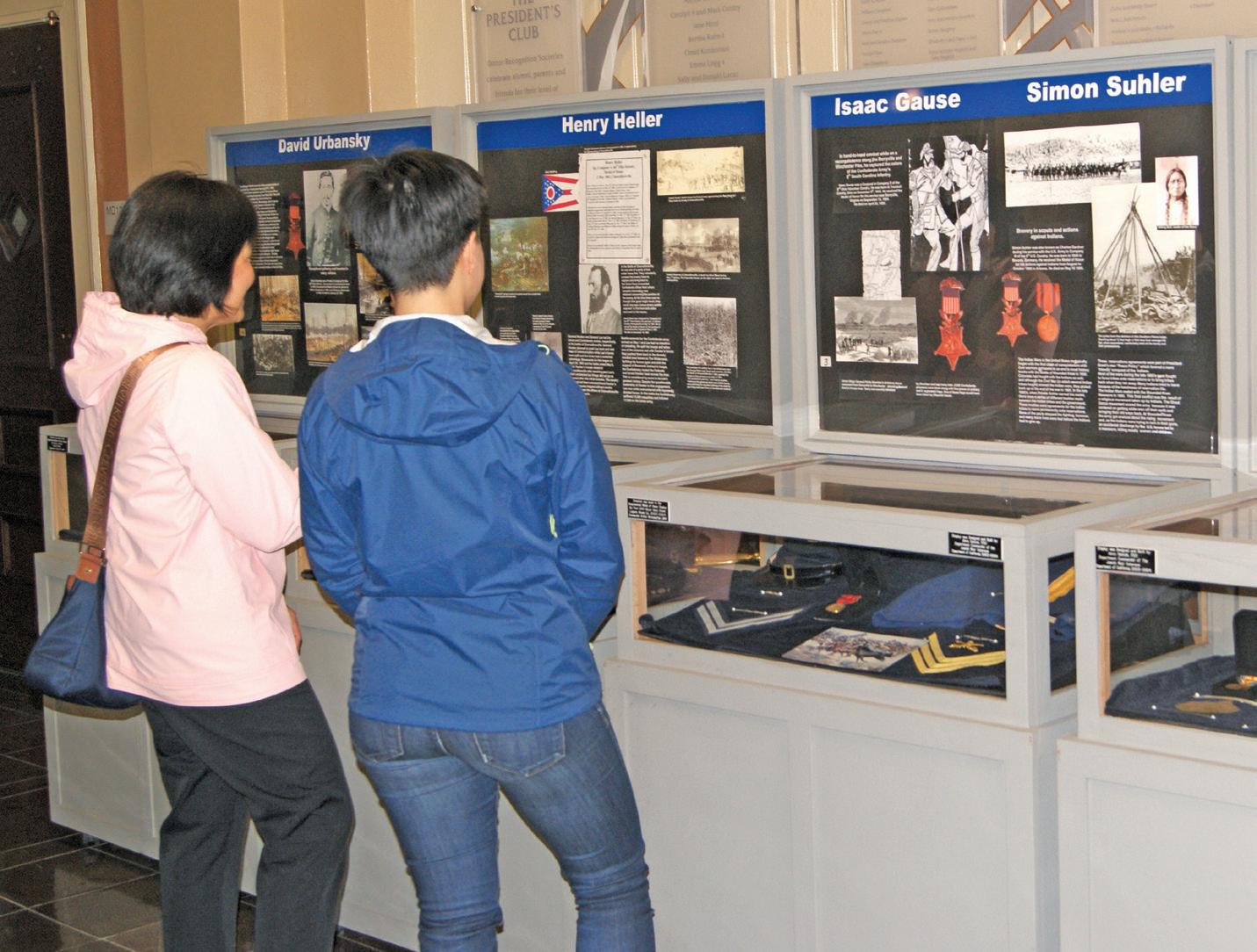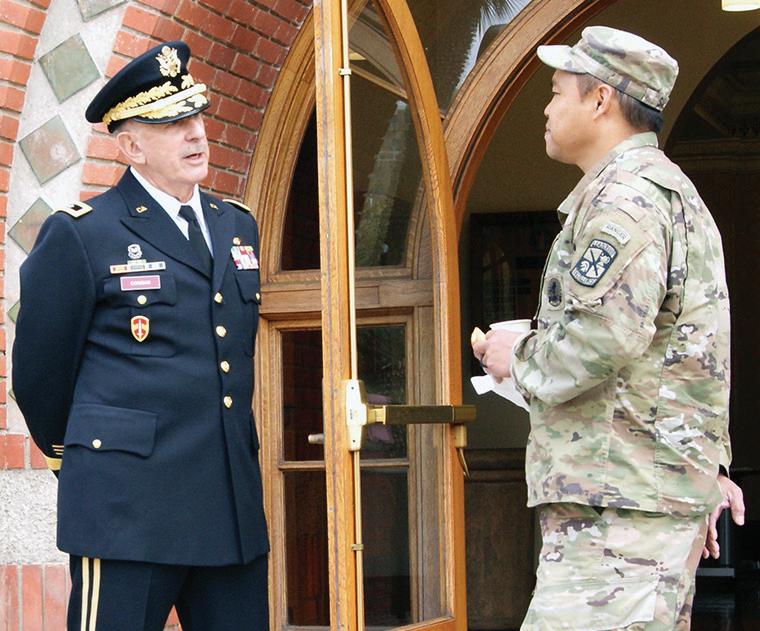
5 minute read
San Jose exhibit gives Jewish veterans overdue recognition
MAYA MIRSKY | J. STAFF
When Jay Coggan joined the Navy in 1967, there weren’t a lot of other Jews. In Vietnam, he said, rabbis were so scarce that he and his fellow Jewish service members were assigned a Mormon minister as a chaplain.
Advertisement
“It’s an interesting thing to be a Jew in the military,” Coggan, now a major-general and commander of the California State Military Reserve, said in an interview with J. at the opening of the traveling exhibit “Uncommon Valor: Jewish American Medal of Honor Heroes.”
Jews in the armed forces are still not common, but the Jewish veterans and service members who gathered for the March 8 opening at San Jose State University spoke passionately of the need for this part of the American Jewish story to be recognized.
“Jews contribute not just in medicine, law and science, but in military service,” said
Quentin Kopp, a veteran himself and a retired judge, formaer state senator and former San Francisco supervisor (and current J. board member).
The Medal of Honor is the country’s highest award for military valor. Of the more than 3,400 people who have been awarded one, just 17 have been Jewish. They range from Benjamin Levy, a soldier in the Civil War, to Jack Jacobs, who saved a wounded comrade in Vietnam, to Simon Suhler, a Bavarian Jew who received the medal in 1868 for valor in the expansionist Indian Wars. His greatgreat-niece, Irene Spector, herself a Navy veteran, said that Suhler fought against the Apaches under the name Charles Gardner, a nom de guerre that somewhat backfired when it came time to apply for government entitlements.
“He had a heck of a time getting a pension,” Spector said.
The exhibit, which is up through April 10 in the lobby of SJSU’s Tower Hall, is sponsored by the Jewish studies program and the school’s Burdick Military History Project. But the vitrines, which include photos and objects such as replica medals, had a round-
about journey to the South Bay. The exhibit was created in 2005 by Army veteran Greg Lee, head of the Jewish War Veterans’ California branch, who made it with a fellow veteran for the California State Military Museum in Sacramento. But at some point, it got lost in the system.
“They donated it to the California military department, and unfortunately it sat dormant for a number of years,” said Col. Kirk Sturm, head of the California Military Museum Command.
After being discovered sitting in a building on the Los Alamitos training base, it’s been brought back to life — and spruced up — under the auspices of the California State Guard. It has visited a JCC in Irvine and Wilshire Boulevard Temple in Los Angeles, and after San Jose it’s going to Long Beach.
The exhibit launch in San Jose included a day of lectures, including the 2020 Jewish Studies Levinson Memorial Lecture given by Kopp, who in his talk traced Jewish involvement in the military back to pre-American Revolution.
“The history of American Jews in military service begins not in the 18th century, certainly not in the 19th century or thereafter, but begins in 1657,” he told those assembled.
Despite that long history, a tiny number of Medal of Honor recipients have been Jewish. Was that rooted in anti-Semitism? Some think so. It’s why legislation was introduced in Congress in 2001, directing the military to take a second look at Jewish war heroes who might have been discriminated against. The Leonard Kravitz Jewish War Veterans Act did not pass, but it created a larger movement for examining whether minority service members may have been skipped over for similar reasons. (Leonard Kravitz was posthumously awarded a Medal of Honor; his other claim to fame is being the uncle of singer Lenny Kravitz.)
Many minorities have since received the medal, but only one was Jewish, and it was awarded in 2005 to Tibor Rubin, a Korean War veteran who died in 2015.
What that means is up for debate, but Coggan is surprised. “[That] makes me think there still was some discrimination,” he said. “That can’t be.”
He knows times have changed since he first enlisted.
“There was a tremendous amount of anti-Semitism in those days,” he said, when every possible offensive slur against Jews was used. “It was very common. We heard it all the time.”
Though things are better now, the idea that Jews don’t serve remains prevalent. In 2017, Israel’s then-Deputy Foreign Minister Tzipi Hotovely caused outrage when she said of American Jews, “Most of the Jews don’t have children serving as soldiers, going to the Marines, going to Afghanistan, or to Iraq. Most of them are having quite convenient lives.”
San Jose State history professor Jonathan Roth, who runs the Burdick Military History Project and is a mentor for student veterans on campus, would like to counter that narrative. He said he wouldn’t mind seeing more young Jews consider the military — and not just the Israel Defense Forces.
“As Americans, as much as we support Israel, I think if we’re going to do military service, our place is with the United States military,” he said.
Having more Jews in the service might have changed the experience for Ken Gold, a captain in the California State Guard and a member of San Jose’s Temple Emanu-El. When he joined the guard in 1982, he kept his Jewish identity to himself to avoid standing out.
“Even to this day I keep a low profile,” he said.
Roth hopes people will see the stories of the Medal of Honor recipients and learn from them: not only about history, but about the sacrifices of Jewish Americans in the military and what that means for the larger story of Jews in the United States.
“It’s, as they say, ‘good for the Jews’ to have Jews in military service,” he said. n
San Jose State professor Jonathan Roth
Visitors at the Jewish Medal of Honor exhibition in San Jose.
MAYA MIRSKY MAYA MIRSKY Maj.-Gen. Jay Coggan, Jewish Navy veteran and commander of the California State Military Reserve, with unnamed attendee on March 8.











